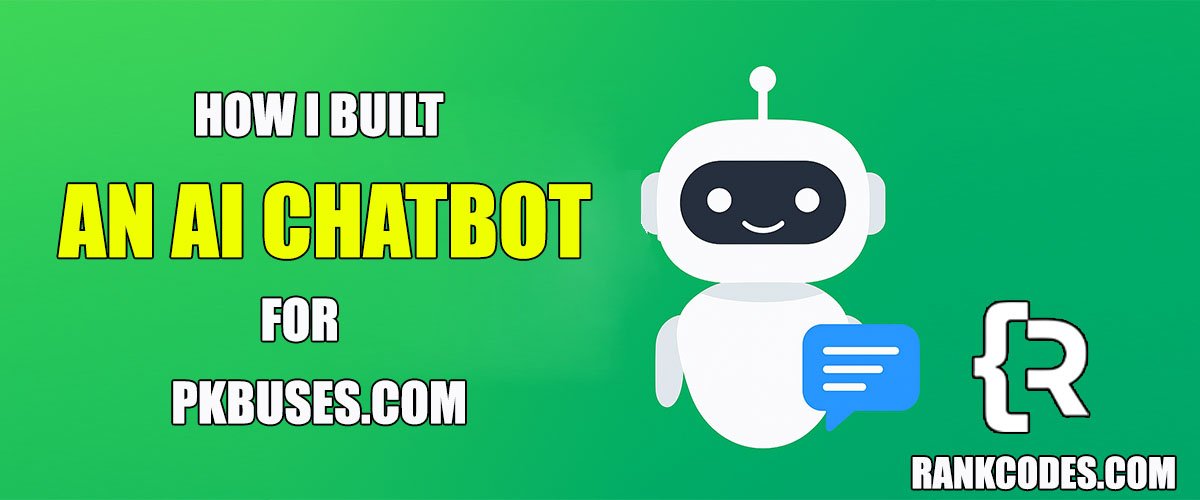The transport industry in Pakistan is changing fast. Travelers no longer want to call helplines or scroll through endless pages to find bus timings or ticket fares. They expect quick answers — the same way they chat with a friend.
At PKBuses.com, a trusted portal for bus fares, timings, and operators, I wanted to make travel information easier to access. That’s where the idea of an AI chatbot for travel websites came in. I built “Bus Buddy”, an AI-powered assistant that helps visitors find routes, ticket prices, and schedules within seconds.
Why Add an AI Chatbot to a Travel Website?
Travel websites face the same questions every day:
- “What’s the Lahore to Karachi bus fare?”
- “Which companies operate from Islamabad to Multan?”
- “How can I book tickets online?”
Instead of answering these questions manually, an AI chatbot can deliver instant and reliable responses. For PKBuses, this brought clear benefits:
- Better User Experience → Quick, human-like replies.
- Higher Engagement → Visitors stay longer on the site.
- Traffic Growth → Internal links guide users to Bus Timings and Bus Fares.
- Less Workload → Reduced need for repeated customer support.
The Tools I Used
I kept the setup simple yet powerful:
- WordPress Plugin: AI Engine Pro → The Pro version lets me add a knowledge base, customise training, and connect APIs.
- OpenAI API → Gave the chatbot its natural language skills.
- Model Choice → GPT-5.1 Mini. It’s lightweight, cost-effective, and accurate enough for live travel queries.
The flow looks like this:
User → Bus Buddy Chatbox → AI Engine Plugin → OpenAI API → Instant Answer + PKBuses Link
Defining the Chatbot’s Role
I trained Bus Buddy with a clear role and scope:
- Helpful & Friendly → Answer like a real travel guide, not a robot.
- Stay Focused → Stick to fares, timings, operators, routes, and ticket guidance.
- Multi-Language → English, Urdu, and Roman Urdu replies.
- Always Link Back → Suggest useful PKBuses pages such as:
If Bus Buddy doesn’t find an answer in the knowledge base, it silently checks the web but still shares a PKBuses link for details.
Example Chat Flow
User: “Faisal Movers Lahore to Islamabad fare?”
Bus Buddy: “It usually starts from around PKR 2000, depending on class. Full details here: Faisal Movers Fare List. Do you also want bus timings?”
This mix of direct answers + relevant links makes the chatbot feel useful and natural.
Benefits for the Transport Industry
By adding an AI chatbot for a travel website, PKBuses gained:
- Faster Information Delivery → No long searches required.
- Stronger User Trust → Visitors rely on PKBuses as a verified source.
- SEO Improvement → Internal links help search engines crawl more pages.
- Future Opportunities → The same setup could expand into cargo, train services, or tourism platforms.
Final Thoughts
AI is no longer just a buzzword. It’s actively changing how people interact with travel platforms. With the right tools — WordPress AI Engine plugin, OpenAI API, and a well-structured knowledge base — I built a chatbot that helps thousands of travelers daily.
If you own a transport or travel website, an AI chatbot can make your platform smarter, faster, and more user-friendly. That’s exactly what Bus Buddy is doing today at PKBuses.com.
FAQs: How I Built an AI Chatbot for PKBuses.com
What is Bus Buddy on PKBuses.com?
Bus Buddy is an AI-powered chatbot that helps travellers quickly find bus schedules, ticket prices, routes, and operators in Pakistan.
Which technologies were used to build Bus Buddy?
It was built using the AI Engine Pro, integrated with the OpenAI API for natural language processing.
Can Bus Buddy book bus tickets for me?
No, Bus Buddy doesn’t book tickets directly. It guides you to trusted platforms, such as bookme.pk or the operator’s official website.
Does Bus Buddy support the Urdu language?
Yes. Bus Buddy replies in English, Urdu, and Roman Urdu, depending on how the user asks the question.
How does the chatbot improve travel websites?
An AI chatbot improves user experience by providing instant answers, boosting engagement, reducing support workload, and linking to relevant pages for SEO.

